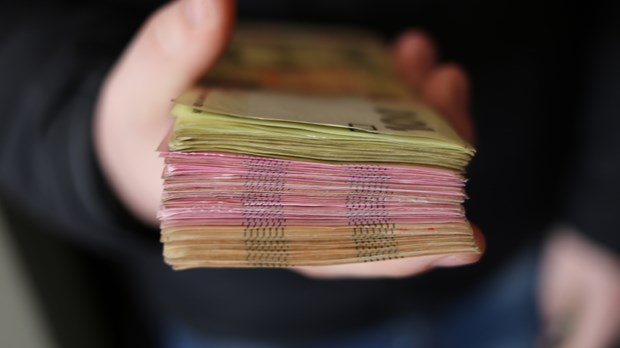Unpoverty [uhn-pov-er-tee] -noun
1. the state of eradicating extreme poverty
2. the reversal of a perpetual state of deprivation
3. the provision of basic human needs
Base word origin: 1175; Medieval English poverte
Old French poverte Latin paupertatem, small means
Much of what we learn and read about the poor has kept them distant and impersonal. They have become an intellectual category, a problem to be solved. Some politicians and policy makers may find that useful, but if we want to achieve unpoverty we need to know these people as unique and worthy human beings. A mother living on the streets of Kolkata loves her child as much as a mother living in a gated community in suburban Chicago. A child helping his father scavenge through garbage has the same right to an education as a youngster enjoying recess on her school playground in Orange County.
We need to see the poorest of the poor with new eyes. Rather than pity them for their poverty, respect them, learn from them, and maybe even recognize yourself in their hopes, dreams, and spirits. Just like you, the poor want to enjoy their families, prosper, and reach out to help someone else. That is the way I believe that extreme poverty will become obsolete.
For the past 25 years I have visited the cardboard and tarpaper huts of families who live on garbage dumps. I've hiked dusty paths to African villages whose names do not appear on most maps. I've tiptoed across makeshift bridges over open sewers that give a new meaning to waterfront homes.
The purpose of my travel is business, but I don't wear a power suit or negotiate multi-million dollar contracts in richly paneled board rooms or over sumptuous meals in elegant restaurants. The clients I work with are not vice-presidents or CEOs, and you will not find their businesses on the Fortune 500 list.
Yet.
I work for an organization that provides small loans to very poor people in the developing world so they can start businesses and feed their families. The technical term is microenterprise development or microfinance. Whereas a start-up business in the United States might seek several million dollars in venture capital, our typical initial loan is less than $150. These are not gifts, but real loans with interest and payment schedules. Before prospective business owners receive their loan, they are required to develop business plans that must be approved by a loan officer. By just about any conventional standard, our clients would not qualify even as high-risk borrowers. Credit checks are out of the question because these people live in a barter-and-cash-only world. We make many loans to people who officially don't exist because they have no identification papers, no passports, no birth certificates.
Most of the businesses I work with are tiny in revenue, but giants in resourcefulness, innovation, and entrepreneurship. When it comes to supply-chain management, containing labor costs, liquidity, return on investment, and net profit margin, businesses I work with could teach Fortune 500 companies a few things. And while I know many fine business leaders in the West who are tireless workers, no one outworks the business owners I have met in the developing world.
You would think that loaning money to people so poor might create a huge number of defaults, but our overall record is very good. Of the more than one million loans we make each year, only two to five percent have defaulted. Something tells me that most banks in the United States would love that kind of record.
When I began working in international development, I held the common view that while we need to reach out and help the poor as much as possible, we will never eliminate poverty. Isn't it just a fact of life? Much of what was then called the third world, particularly Africa, was considered hopeless. Massive aid from the developed nations has poured into those regions with little or no overall improvement. The attitude among many ordinary citizens in the United States is that we have too many problems in our own country to be concerned about remote villages around the world. As a follower of Jesus, I accepted the faulty interpretation of the Bible that "the poor will be with us always." Still, I was committed to doing my part to try to make a difference. Like most people, I did not believe we could eliminate poverty, at least not in my lifetime. Now after more than two decades of working closely with some of the poorest people, living in some of the poorest nations, I've changed my mind.
About 1.3 billion people today survive on one dollar a day. These people are not the problem. Rather, they are assets. They remain mired in poverty primarily because of latitude and longitude, not laziness or stupidity. Every day's work earns that day's meal, with nothing left over to build on, and no hope of escape. With strategic empowerment from others, however, these survivors prove they can be a large part of the solution.
I believe we can eradicate extreme poverty. And if we can, then we must. I'm not alone. Today an encouraging wind of change is moving us away from the previous notion that the poor are an inevitable presence, siphoning off crumbs of what the wealthy produce. Fueled by the voices and actions of prominent leaders, many people are no longer conceding that more than a billion people must endure life on one dollar a day. I see a growing desire to cause radical change that will force our grandchildren to learn about extreme poverty in history books. Events such as the U.N. Millennium Summit in 2000, Muhammad Yunus winning the 2006 Nobel Peace Prize, and authors like Jeffrey Sachs writing about it, have convinced many of us that we will see an end to extreme poverty during our lifetime. Bill Gates, Warren Buffett, Pierre Omidyar, and other philanthropists have made strategic international charity cool, rendering social entrepreneurship the vogue. Entertainers like Bono have popularized social justice. Oprah skyrocketed the early growth of a poverty-alleviation organization, Kiva. Clearly, the idea that extreme poverty can be eradicated has reached the tipping point.
It hasn't hurt that we are more connected to people around the world than ever before, reminding us that we are part of a global community and that as such, we cannot be concerned only about our own welfare.
The Internet, e-mail, social networks, cell phones, and 24/7 international news channels bring the favelas of Brazil and the slums of Manila into our living rooms. Even our entertainment invites us to consider both the dignity and destitution of the poor and oppressed. Who can forget the harshness of child slavery in Slumdog Millionaire or the innovative plan to win a war with education in the bestselling book, Three Cups of Tea? Globalization has made us more aware that the majority of our extended family members are desperately poor.
As awareness expands, our attitudes evolve. Simply because some members have a different complexion, live ten thousand miles away, have minimal education in strikingly different cultures, they are no less valuable or deserving. Though there have been many well-intentioned yet faulty attempts to help the poor in the past, a new spirit is emerging, one that says, "Convince me that a solution is significant, sustainable, and scalable—and I'm on board."
I want people to have a spirit of optimism and hope about poor people. Unpoverty is possible—we can undo extreme poverty. The working poor, given the opportunity, are undoing the chains of poverty and providing opportunities to others in their communities. What I have learned most from the poor is that they are poor only in material terms. Their poverty doesn't define their character or their desire to better themselves and their families.
I consider it a privilege to work with people whose net worth does not equal the value of my wristwatch. Like many who work in international development, I went into this career sincerely hoping to help the poor by helping them help themselves. Although it is gratifying to see that this really does work, the poor have taught me far more than I could ever teach them. As a white, fairly well-educated, affluent, Christian American, I thought I knew all about things like family and faith and gratitude. From the poor, I have learned that so much of what I thought I knew only scratched the surface. They have given me a deeper understanding of the things that really matter in life. For that I am grateful.
Some of the profound moments and pivotal junctures of my life have occurred in the developing world. When I'm with the poorest of the poor, I somehow feel closer to God. I feel connected and energized. There have been times I have wept uncontrollably when confronted and confounded by nearly unbearable privation. Yet those encounters have caused me to acknowledge that I am the one most bankrupt. As I begin to appreciate their wealth, I start to recognize my own contrasting hunger and nakedness.
Do I really believe we can undo extreme poverty—people living on $1 a day-in my lifetime? Given the fact that I am already middle-aged, that's an ambitious goal, but yes, I really do believe it. Part of the reason is that in addition to my own organization, Opportunity International, I have worked alongside dozens of other strategic organizations that empower the poor. I work in microfinance. Others focus on disaster relief and refugee resettlement. Others address issues of human trafficking and justice, education, housing, health, pure water, farming and the environment. Collectively we address the spectrum of basic human needs, each bringing our expertise to bear for the sake of these deserving members of our global village.
Their stories will help you better understand the riches of the poor, affirming their intrinsic value, so that you will join the economic revolution to find ways to support and empower them. I know we can create a world of unpoverty, and it will happen a lot faster if we have one more important resource.
You.
Adapted from UnPoverty, by Mark Lutz, copyright(c) 2010. Used by permission of UnPoverty Communications PO Box 3112 Glen Ellyn, IL 60138. http://www.unpoverty.org/.
Copyright © 2011 by Christianity Today/ChristianBibleStudies.com. Click here for reprint information.













